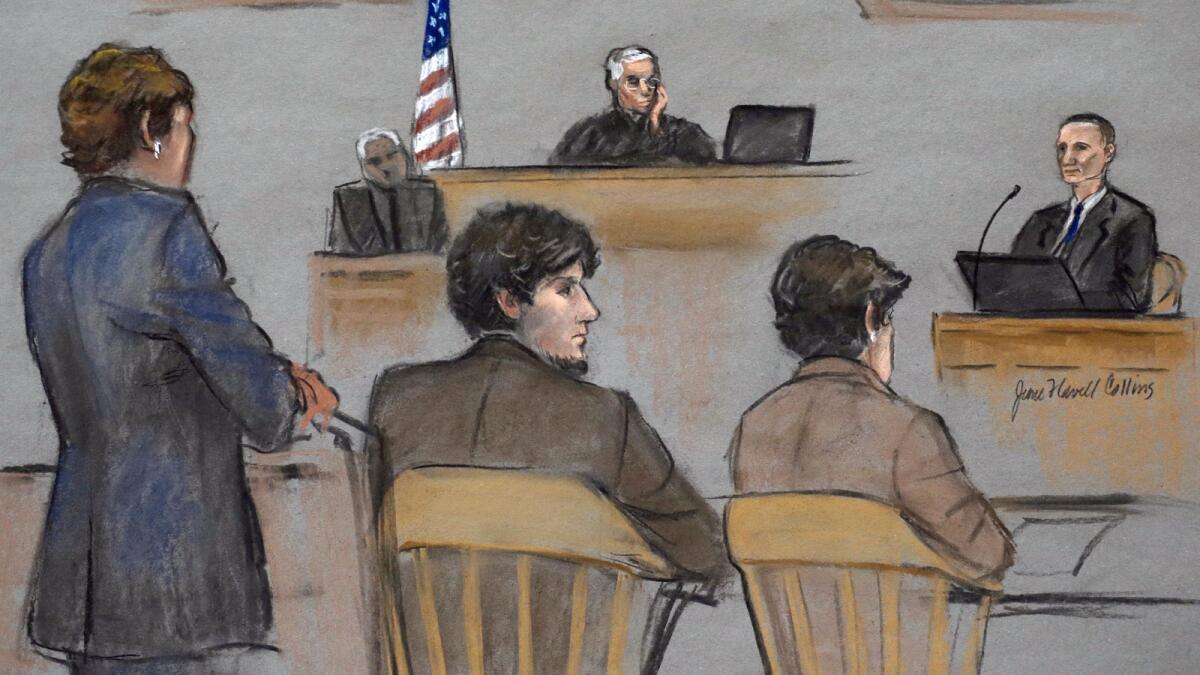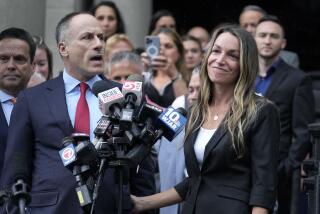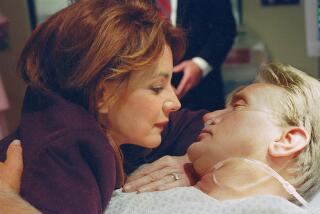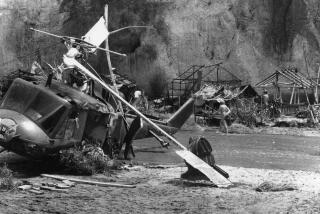Victims in Boston Marathon bombings tell jurors about chaos, carnage

In this courtroom sketch, Bill Richard, right, testifies at the federal death penalty trial of Dzhokhar Tsarnaev, second from left, in Boston. Tsarnaev is between defense attorneys Judy Clarke, left, and Miriam Conrad and U.S. District Judge George O’Toole Jr. presides.
- Share via
Reporting from Boston — The tall, well-built man, dressed in a hooded sweater and carrying a black backpack, bumped into Jeffrey Bauman in the throngs of spectators at the Boston Marathon finish line.
Bauman, who had come to cheer on his girlfriend, immediately thought the solitary man looked out of place. Not realizing it, he had just come in contact with Tamerlan Tsarnaev, one of two brothers later accused of planting pressure-cooker bombs at the 2013 race.
“He just looked very suspicious,’’ Bauman testified in federal court here Thursday, on the second day of the capital murder trial of Dzhokhar Tsarnaev, Tamerlan’s brother. “He wasn’t watching the race. It didn’t look like he was having fun like everyone else.”
A few moments later, Bauman glanced again and saw the backpack sitting on the ground but the man was gone. “I thought it was weird,’’ he recalled, adding that he wondered whether he should alert security. “I thought about airports, but this was Boston.”
Seconds later – those thoughts still playing in his head – twin explosions tore through the crowd, killing three people and injuring 260 others. Bauman, who lost both legs above the knees, came to court wearing short pants; that was easier, he said, with his prosthetic limbs.
His chance encounter with Dzhokhar Tsarnaev’s older brother put Bauman on the long line of government witnesses that prosecutors are asking to share their recollections with a federal jury of 10 women and eight men.
When the first explosion hit, “I saw a flash, heard three pops and I was on the ground,” Bauman said. “I opened my eyes and I could see the sky. I thought, ‘That was a big fireworks.’ It smelled like the Fourth of July.”
His legs, Bauman said, “were pure carnage. I could see my bones sticking out.” Someone spread a jacket over him. “I thought, ‘This is how it’s going to end.’”
Then he heard the second explosion, this one set off by Dzhokhar Tsarnaev. “I knew my legs were gone. I knew they were gone instantly.”
At the hospital, unable to talk, he scribbled notes to FBI agents and Massachusetts state police. He described the man he saw with the backpack.
“He wore a cap and aviator shades and he had a five o’clock shadow and a hoodie. I wrote all that down.”
Tamerlan Tsarnaev died several nights later in a police shootout in nearby Watertown, Mass. Dzhokhar Tsarnaev was captured the next day. If convicted, he faces the death penalty.
Tsarnaev’s lawyers have acknowledged that their client helped plan and carry out the bombings. “It was him,” attorney Judy Clarke said Wednesday during opening statements. But she emphasized to the jury that Tsarnaev was mesmerized by his older brother and followed his radical lead.
To counter that assertion, prosecutors are trying to lay before the jury the carnage of that afternoon. Whereas some FBI agents testified about collecting surveillance tapes and picking out images of the Tsarnaev brothers at the finish line, most of the witnesses Thursday relived the scenes of blood and severed limbs on crowded Boylston Street.
William Richard, the father of Martin Richard, 8, who was killed, said they were there with other family members: wife Denise, son Henry and daughter Jane. In a photo presented in court, Tsarnaev is seen standing behind the Richard family as they watch the race from behind a barricade.
Richard said the family heard the first explosion “down the road” and he thought they should leave. “You knew it wasn’t good,” he said. He told his wife, “We’re going to go.” But there was not enough time. In the second explosion, “I was thrown into the street.”
In a series of other photos, Richard has made it back to the sidewalk. He lifts the barricade off his wife and children. Denise Richard is reaching for Martin.
William Richard embraces Henry. Jane, 6, is on the ground. She tries to get up but falls. Her legs, her father said, “were blown off at the site.”
He also knew “Martin wasn’t going to make it.... I saw my son alive, but barely, for the last time.... I saw a little boy who had his body severely damaged by an explosion and I just knew from what I saw there was no chance. The color of his skin....”
Henry suffered cuts and scrapes. In addition to losing her legs, Jane was pelted with shrapnel in her back and behind an ear. Denise Richard lost her sight in one eye.
Richard still suffers from hearing loss. “But I can still hear you,” he told prosecutor Nadine Pellegrini, managing a smile. “I can still hear music. And I can hear the beautiful voices of my family.”
Boston Police Officer Frank Chiola testified that he was 20 yards from the second bomb. “You couldn’t tell who was alive or dead,” he said. He found Krystle Campbell. “It looked liked she was in shock. She was coughing,” Chiola said. “Smoke was coming out of her mouth.”
Campbell, 29, a restaurant manager, died, and Chiola stayed with her body until midnight at a marathon medical tent, watching over her.
Boston Police Officer Lauren Woods testified she tried to save Lingzi Lu, a 23-year-old Boston University graduate student. “She was vomiting profusely. I tried to clear her mouth and airways,” the policewoman said.
She saw “blood, flesh, bone” covering her lower body, and “her whole body was shaking, quivering. She had vomit in her hair, debris in her hair, and her eyes kept rolling in and out.”
An emergency medical technician said, “She’s not going to make it,” and he moved on to others injured. But Woods said she stayed with Lu. “I continued chest compressions with her. I made eye contact with her. I just kept talking to her.”
She told her, “‘Lingzi, stay with us. You can do this. Stay strong.’” Someone placed a white sheet over Lu’s body; someone else asked who would stay with her. Woods said, “I immediately volunteered.”
The trial will resume Monday morning.
On Twitter: @RickSerranoLAT
More to Read
Sign up for Essential California
The most important California stories and recommendations in your inbox every morning.
You may occasionally receive promotional content from the Los Angeles Times.











